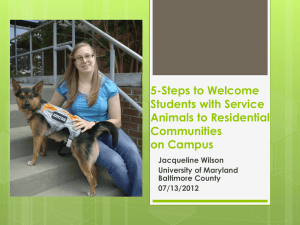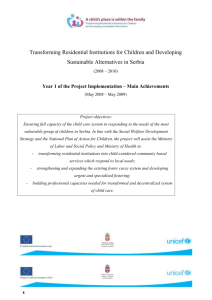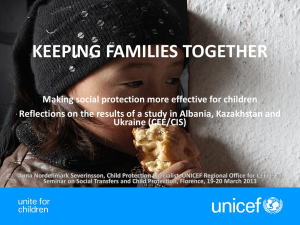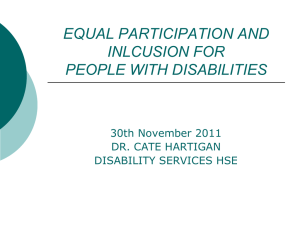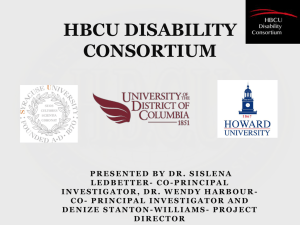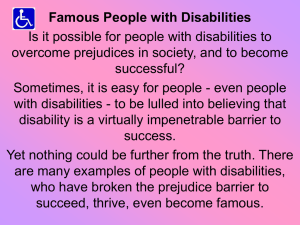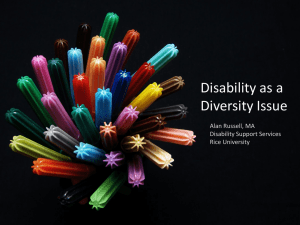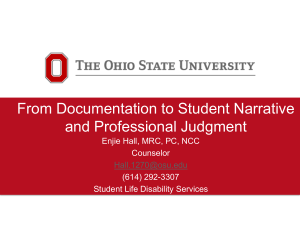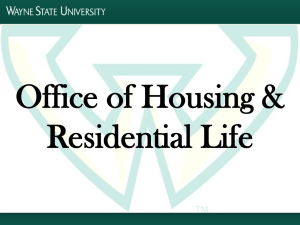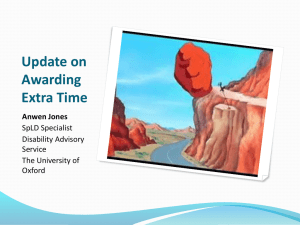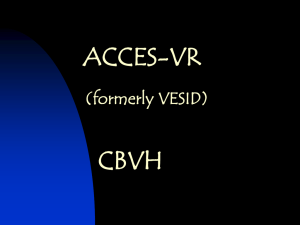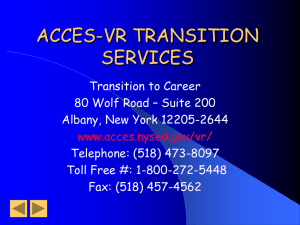File - Northern Kentucky Cooperative for Educational
advertisement
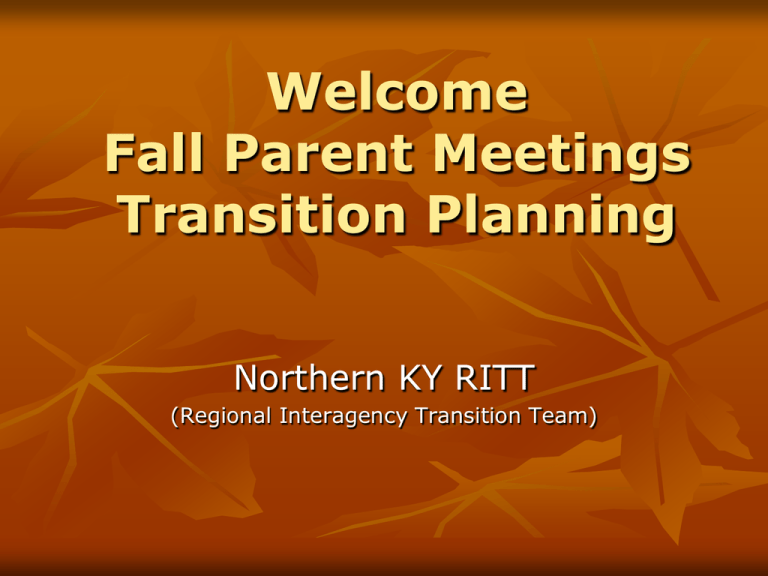
Welcome Fall Parent Meetings Transition Planning Northern KY RITT (Regional Interagency Transition Team) Agenda What is “Transition Planning?” Individual Learning Plans Diploma vs. Non-Diploma Office of Vocational Rehabilitation Services What Happens at Age 18? Legal/Financial Considerations Post-Secondary Education, Work, or Both? Financial Supports for services Residential Options Recreation/Social Opportunities Break-Out Session Transition Planning Assessment and Goals What is Transition Planning? Transition refers to “CHANGE.” Transition Planning is about planning for the kind of life you want after high school Life after high school will be a big change and you will want to be prepared. CHANGE There is one BIG change in store for you: Students who presently receive special education services under IDEA are no longer “entitled” to services after graduation under this same law. Services will then fall under the ADA and persons will need to apply for services and go through the eligibility process. IDEA: Diploma vs. NonDiploma Diploma -Successful completion of at least 22 approved units of credit. Certificate Program -ARC decision -Determined prior to high school. -Meets requirement of alternate assessment. Individual Learning Plan (ILP) ILP’s are a record of student’s strengths, interests, and goals related to transition Keeps students & school staff focused on needs and goals Web-based system (“Career Cruising”) All graduates of the 2009 class have completed an ILP ALL students are required to participate – ARC determines format for students with an IEP (paper or web) Office of Vocational Rehabilitation Assisting eligible students with disabilities transition from school to work While in high school How to qualify for services Create an Individual Plan for Employment Authorize a vocational assessment Discuss accommodations/modifications in high school vs. college Possibly refer to Community Based Work Transition Program in final 2 years Just prior to graduation Link to adult services - case management, short term counseling, adult day care, etc. Employment resource specialists Supported employment agencies Carl D. Perkins Vocational Training Program referral Work Adjustment program, TBI skills training, Life skills Enhancement program, D&A program, work training programs, residential campus Upon Graduation Assist with post secondary education and training tuition, books, supplies (financial needs test) apprenticeship programs are currently fully sponsored tools, certifications, licensing, uniforms Assist with updating information for eligibility to special services drivers training, assistive technology, tutoring, advocacy What Happens at Age 18? Legal & Financial Considerations What happens when my child reaches age 18? The school district (through ARC) will notify you at least 1 year before your child’s 18th birthday that the rights you have as a parent will go to your child at age 18. This happens unless the school district receives evidence that a court order or legal document proves you are your child’s guardian or representative in educational matters. Guardianship A legal relationship between a capable adult and a person with a legally documented disability. May become necessary to legally enable another person to make decisions for and act on behalf of the person with a disability State Guardianship Office is used when there is no other suitable person able to perform the duties of guardianship Some families may be eligible to waive court/legal costs for the guardianship process – Contact: District Court Clerk’s office in your county of residence Conservator May be appointed if a person with a disability only needs assistance managing financial affairs. May be appointed alone or in combination with a guardian to handle the financial affairs of a person with disabilities. Power of Attorney A person with may authorize someone else to make certain decisions on his/her behalf. Allows a person control over the powers granted and may be revoked or modified as a person desires. Wills If a parent of a child with a disability dies without a will, property will be distributed. Distribution of assets may jeopardize government benefits or result in cost of care charges. You should have special provisions for distribution organized by an attorney when a child with a disability is involved. Trusts Hold money and property that the grantor leaves for the benefit of another person. Many different trusts for various purposes. Supplemental discretionary trusts are designed so that earnings supplement basic care of a person with disabilities and do not replace public funds (i.e. SSI and Medicaid) Supplemental Security Income (SSI) A federal income supplement program designed to help people who are aged, blind, disabled who have little or no income. The amount is for food, clothing, & shelter To qualify for SSI, an individual is allowed to have assets of no more than $2,000. Social Security Disability Insurance (SSDI) A worker who is disabled can receive a monthly cash payment to replace some lost income and Medicare medical support. Medicare provides medical coverage beginning two years after benefits start. Disabling impairment must have started before age 22. Parent who paid into social security must have become disabled, retire or dies in order for the adult child with a disability to receive benefits. Post-Secondary Education Post-High School Education Adult Education – GED, Basic Skills Improvement, Online Short-term, individualized job training College – public, private, university and community/technical Adult Education Services provide academic skills instruction, GED preparation, and reading instruction for eligible adults. Other possible services include family literacy, ESL instruction, life skills, employability skills and computer literacy KY Adult Education website: http://kyae.ky.gov Short-Term Job Training A variety of programming options offered across the Northern Kentucky area. Brighton Center for Employment Training 859-491-8303 extension 2201 The Center for Employment Training (CET) is a short-term, skill-specific, employment training program. Training areas are Automated Office Skills, Medical Assisting, or Building Maintenance. Training is individualized and hands-on. Concurrent GED classes are available. Short-Term Job Training Redwood Computer Learning Center (CLC) to be edited 859.331.0880, ext 237 The CLC strives to enhance the employability of individuals with disabilities by teaching professional business skills through an adapted curriculum. The instruction features: Low student-teacher ratios Formal instruction with hands-on activities Assistive technology support Nursing & personal care assistance Three quarters of successful participation in the Professional Business Skills program earns a certificate of completion. Elective and/or custom courses are also available through the CLC. Trade Apprenticeship Training Home Builders Association of Northern KY (HBA) http://www.hbanky.com/careers.html xxxx xxxx, Director of Professional Development 859-331-9500 Training classes in Carpentry, Electricity and Heating and A/C are taught by professional trades-people for tradespeople. The HBA trades training classes operate September through March of each year and meet two nights per week for three hours per evening. Union Building Trades Apprenticeship Training Training in Asbestos Workers, Boilermakers, Masons, Carpenters, Compositions Roofers, Electricians, Glaziers, Millwrights, Painters, Pipefitters, Plasters, Plumbers, Ironworkers, Sheet Metal Workers, Operating Engineers, Telecommunications, and more. http://www.glbctc.org/ (Northern KY and Louisville) http://www.cincinnatibuildingtrades.org/ (Cincinnati) Colleges - Public Gateway Community and Technical College 859441-4500 Disability Services 859-442-4120 http://www.gateway.kctcs.edu Northern Kentucky University 859-572-5220 (Admissions) Disability Services 859-582-6373 http://www.nku.edu Maysville Community and Technical College 606-759-7141 Disability Services 606-759-7141 ext. 66143 (check ext.) http://www.maysville.kctcs.edu Online Public Colleges in KY Kentucky Virtual University (title change) http://www.kyvu.org/home.htm Colleges - Private Thomas More College 859-341-5800 http://www.thomasmore.edu Brown-Mackie College 859-341-5627 http://www.socaec.com Beckfield College 859-371-9393 http://www.beckfield.edu Daymar College 877-258-7796 http://www.daymarcollege.edu Financial Aid for College State http://www.kheaa.com Kentucky College Access Program (CAP) Kentucky Education Excellence Scholarship (KEES) Federal http://www.studentaid.ed.gov; to apply-- http://www.fafsa.ed.gov/ Pell Grant Stafford Loans (must be repaid) Federal Supplemental Educational Opportunity Grant (FSEOG) Disability Services – College vs. High School Different laws and different expectations of independence http://www.ed.gov/about/offices/list/ocr/transition.html http://www.ed.gov/about/offices/list/ocr/docs/auxaids.html http://www.ncld.org/images/stories/downloads/parent_center/t ransition_to_college.pdf Work Programs Work/Activity Programs There are 5 types of work/activity programs. The level of supervision varies by type. Funded by KY-OVR Competitive Employment – Able to work independently with minimal support Supported Employment- Able to work independently with OTJ supports and follow-up Funded by other private and government sources Sheltered Work Programs – Supervised job sites Adult Day Training Programs – Training in personal care, communication, social and vocational skills Adult Day Centers – Serves physically/mentally impaired in protective settings Work/Activity Programs Agencies providing work/activity programs include: BAWAC, Inc. 859.371.4410 Brighton Center 859.491.8303 Cardinal Hill 859.525.1128 New Perceptions Inc. 859.344.9322 NorthKey 859.781.5586 The Point/Arc of NKY 859.491.9191 #22 Redwood 859.331.0880 Tri-Generations 859.525.4192 Active Day 859.(vanessa) Financial Supports for Services (WAIVERS) NorthKey THREE KEY WAIVERS Michelle P – refer to handout Supports for Community Living (SCL) Home & Community Based (HCB) – related to medical needs Residential Services Residential Services Serves individuals with physical or developmental disabilities who require varying degrees of support. Assistance is provided in the areas of Transportation Training Medication Support Daily Living Skills/Household Skills Social Skills Money Skills Residential Services Funding and Placements Funds provided by: SCL – Supports for Community Living Waiver Private pay 4 Types of Residential Placements: Group homes – 4 to 8 person occupancy, 24hour staff Staffed residences – 3 person occupancy, 24-hour staffing Supported apartments – semi-independent living Adult foster care – residential support in a foster care home Agencies Providing Residential Services: Aspen NorthKey The Point/Arc of NKY Tri-Generations Volunteers of America 859.525.4999 859.331.3292 859.491.9191 859.525.4192 859.372.5600 Recreational/Social Programs Recreational/Social Programs It is important that friendships and social activities continue after high school. It is important for an individual’s growth and development as well as their quality of life. Recreational/Social Programs Agencies providing recreational programming include: Milestones 859.694.7669 NorthKey 859.781.5586 The Point/Arc of NKY 859.491.9191 ex. 32 Redwood 859.331.0880 Rising Star Studios 859.640.9292 Special Olympics 859.525.7705 The best way to decide if an agency’s program is right for you is to visit their program. Many adult service agencies have waiting lists, so don’t delay! Enroll as soon as possible! More information can be found in your “Life Needs” booklet. Break Out Session Post-Secondary Education Work/Activity Programs Residential Programs Recreational/Social/Respite Programs Thank You for Coming
